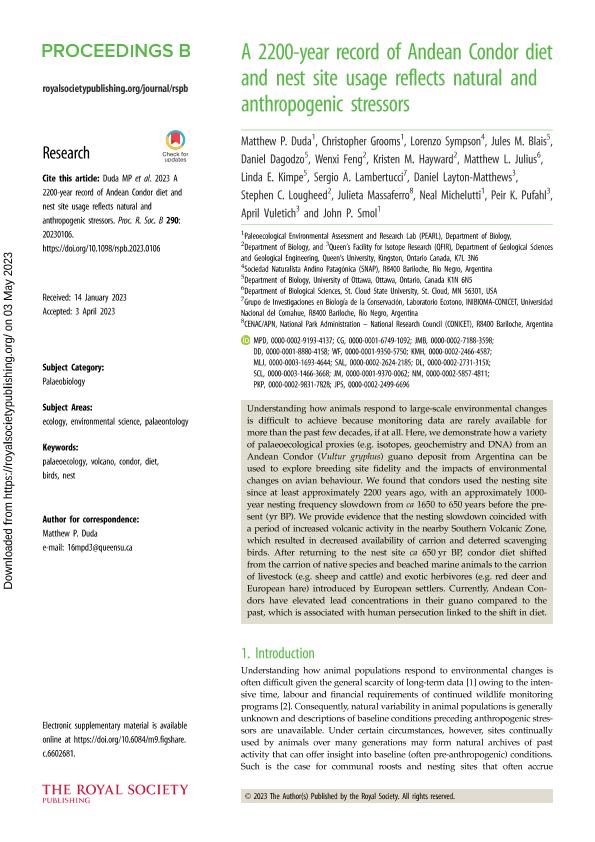Artículo
A 2200-year record of Andean Condor diet and nest site usage reflects natural and anthropogenic stressors
Duda, Matthew P.; Grooms, Christopher; Sympson, Lorenzo; Blais, Jules M.; Dagodzo, Daniel; Feng, Wenxi; Hayward, Kristen M.; Julius, Matthew L.; Kimpe, Linda E.; Lambertucci, Sergio Agustin ; Layton Matthews, Daniel; Lougheed, Stephen; Massaferro, Julieta
; Layton Matthews, Daniel; Lougheed, Stephen; Massaferro, Julieta ; Michelutti, Neal; Pufahl, Peir K.; Vuletich, April; Smol, John P.
; Michelutti, Neal; Pufahl, Peir K.; Vuletich, April; Smol, John P.
 ; Layton Matthews, Daniel; Lougheed, Stephen; Massaferro, Julieta
; Layton Matthews, Daniel; Lougheed, Stephen; Massaferro, Julieta ; Michelutti, Neal; Pufahl, Peir K.; Vuletich, April; Smol, John P.
; Michelutti, Neal; Pufahl, Peir K.; Vuletich, April; Smol, John P.
Fecha de publicación:
05/2023
Editorial:
The Royal Society
Revista:
Proceedings of the Royal Society of London. Series B: Biological Sciences
ISSN:
0962-8452
Idioma:
Inglés
Tipo de recurso:
Artículo publicado
Clasificación temática:
Resumen
Understanding how animals respond to large-scale environmental changes is difficult to achieve because monitoring data are rarely available for more than the past few decades, if at all. Here, we demonstrate how a variety of palaeoecological proxies (e.g. isotopes, geochemistry and DNA) from an Andean Condor (Vultur gryphus) guano deposit from Argentina can be used to explore breeding site fidelity and the impacts of environmental changes on avian behaviour. We found that condors used the nesting site since at least approximately 2200 years ago, with an approximately 1000-year nesting frequency slowdown from ca 1650 to 650 years before the present (yr BP). We provide evidence that the nesting slowdown coincided with a period of increased volcanic activity in the nearby Southern Volcanic Zone, which resulted in decreased availability of carrion and deterred scavenging birds. After returning to the nest site ca 650 yr BP, condor diet shifted from the carrion of native species and beached marine animals to the carrion of livestock (e.g. sheep and cattle) and exotic herbivores (e.g. red deer and European hare) introduced by European settlers. Currently, Andean Condors have elevated lead concentrations in their guano compared to the past, which is associated with human persecution linked to the shift in diet.
Archivos asociados
Licencia
Identificadores
Colecciones
Articulos(INIBIOMA)
Articulos de INST. DE INVEST.EN BIODIVERSIDAD Y MEDIOAMBIENTE
Articulos de INST. DE INVEST.EN BIODIVERSIDAD Y MEDIOAMBIENTE
Citación
Duda, Matthew P.; Grooms, Christopher; Sympson, Lorenzo; Blais, Jules M.; Dagodzo, Daniel; et al.; A 2200-year record of Andean Condor diet and nest site usage reflects natural and anthropogenic stressors; The Royal Society; Proceedings of the Royal Society of London. Series B: Biological Sciences; 290; 1998; 5-2023; 1-11
Compartir
Altmétricas



